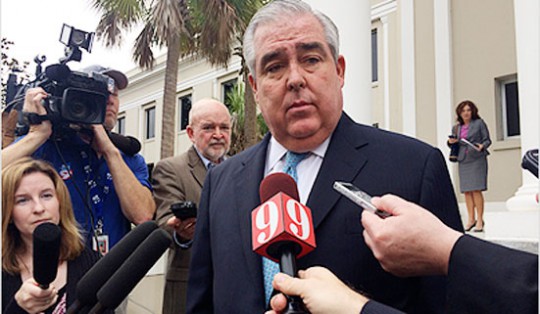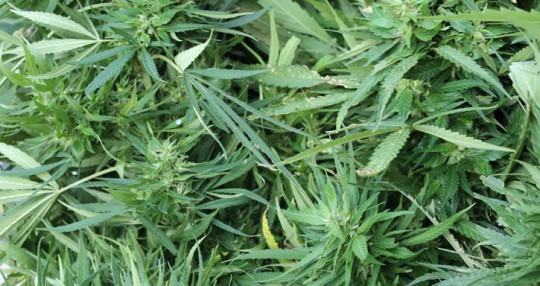Florida Supreme Court Hears Medical Marijuana Ballot Initiative Debate
December 6, 2013
The Florida Supreme Court tried Thursday to cut through the smoke surrounding a proposed constitutional amendment that would allow doctors to prescribe marijuana, with justices set to issue an opinion on whether the ballot initiative can go before voters in 2014.
During oral arguments between supporters and opponents of the measure, the court’s two most conservative justices seemed openly hostile to the proposal. But the fate of the measure could be decided by whether the five more liberal members of the bench decide to back the amendment or not.
The idea of medical marijuana technically isn’t at issue in the case. Instead, Attorney General Pam Bondi, legislative leaders and medical, law enforcement and business groups argue that the ballot title and summary that would appear on the ballot could deceive voters about the scope of the amendment.
They say the ballot language, written by United for Care: People United for Medical Marijuana, wrongly suggests that only people with “debilitating diseases” could get the green leafy substance. Instead, doctors would have a much freer hand to prescribe pot.
Chief Justice Ricky Polston, one of the more conservative members of the bench, appeared receptive to that argument.
“The way I read it, it would seem to be if a student’s just stressed over exams, and they go in and see a doctor, and they said, ‘I’m really stressed out.’ (The doctor says,) ‘Well, I’ve got something I can help you with,’ and prescribes marijuana. Wouldn’t that be included in this?” Polston asked.
Supporters of the proposal deny that the language is that sweeping. Instead, they say, Florida doctors would have to weigh the risks of the medication against the benefits to the patient.
“The sponsors were focused on two things: the patient and how best to make that determination for a patient, which is very much focused on physician decision,” said Jon Mills, representing the amendment’s backers. “So a list (of conditions) alone would not be adequate.”
The amendment is the brainchild of Orlando attorney John Morgan, who says he has poured $1 million of his own money into the effort. The Florida Division of Elections says it has verified 136,458 of the 683,149 signatures that the measure needs to be placed on the ballot for 2014.
Much of the discussion centered on the difference between “debilitating diseases,” which will appear in the ballot summary, and “debilitating medical condition,” the term that appears in the amendment.
“You don’t even have to have a disease to get marijuana under this amendment,” said Solicitor General Allen Winsor, who argued the case for opponents Thursday.
But while Justice Barbara Pariente suggested that the amendment might be imprecise, she seemed skeptical about the idea that the ballot language was misleading.
“It seems that the problem may be in the drafting of the amendment, as opposed to in the title and summary,” she said. “How do we deal with that?”
Lawyers and the justices also tangled over whether the ballot statement that the amendment “[d]oes not authorize violations of federal law” might suggest that possessing marijuana would not be a violation of federal law, something that is false. Mills suggested that it was instead making clear that the state amendment would not change whether pot was illegal at the federal level.
“It’s obvious that the state of Florida cannot change federal law,” Justice Charles Canady retorted. “Wouldn’t you think that that’s obvious?”
Speaking with reporters after the session, Morgan expressed confidence that he would be able to gather enough valid signatures by the Feb. 1 deadline to make the ballot if justices approved the language. And he said that no matter the outcome of the case, victory is inevitable.
“Everybody here knows that one day medical marijuana is going to be legal in Florida,” he said. “We all know that. … Is it going to be 2014 or ‘24? It’s going to happen.”
story by Brandon Larrabee, The News Service of Florida
Pictured top: Attorney John Morgan speaks to reporters outside the Florida Supreme Court after justices heard arguments on whether to allow a constitutional amendment regarding medical marijuana on the Florida ballot. Morgan is backing the amendment push. Photo by Brandon Larrabee, NSF, for NorthEscambia.com, click to enlarge. Pictured inset: Marijuana grown illegally in Molino. NorthEscambia.com file photo, click to enlarge.
Comments
9 Responses to “Florida Supreme Court Hears Medical Marijuana Ballot Initiative Debate”





HEMP should be legalized for cultivation and use in Industrial applications.
MARIJUANA should be taken out of Schedule 4 status and treated like other (far more lethal and debilitating) products like tobacco and alchohol. Marijuana should be taxed like tobacco and regulated like alchohol, available to Adults over the counter at PUBLIX, WALGREENS and any oother retail establishment in the United States.
I feel your pain Alfred O., I too had a stroke that took a part of me and left the rest in pain. i make my comments here with a click on each letter with a mouse. alot of people would rather we take narcotics for pain instead of marijuana all because big pharma pays off the FDA to say so and even that is under attack by those same folks who drink alcohol and use tobacco because the goverment makes money on those poisons. vaporized marijuana is healthy, no side eefect from carcinogens like thier is smoking it. people have been brain washed by our propagandist goverment all in the name of money. the people who have no health problems and take pills have made it even harder for some sick people to get what they need because law enforcement threatens doctors, i have seen them do it with my own eyes..Best wishes alfred, i hope this passes for our sake and others like us.
I am for legalizing it! Used in situations where other meds have not proven to be effective it could greatly improve some people’s quality of life! Also it may just take some of the dealers down a peg or 2 and possible stop some of the associated crime… Dreaming here but maybe…..
DO NOT believe the Randolph Hearst propaganda that got marijuana banned in the USA first place . To think that it was all over rope .
I bet big pharma will fight this, they want patients to buy expensive pain killers instead
some people don’t like the one’s that need this to surive everyday paini lost half use of my body 3 years ago from a major brain attack. also known as a sever stroke. i use to weigh in at about 150 pounds since my stroke i have lost just around 35 pounds due to i lost the tase factor in my brain. so food seems boring to eat as it has no taste. but with haveing som marajauna it helps me consume food withs i gain a few pounds a month and maintain a better life quality. please pass this right that the lord put on this earth for our use just like the air we breath, water we drink its part of human surivel PLease help this passsssss.
The State of California is a prime example of why this is a bad idea. People are going to Docs known to give prescriptions and getting permission to buy pot from dispensories for depression, anxioty, or any ailment. The State of Florida should take close note of this before giving this the OK. On another note, if the people who so badly need pot to comfort them didn’t know this, they’re free to move to Colorada, California, or Washington State.
What really get me is that none of this would be necessary if it were not for the fraud of scheduling Cannabis in the first place. CNN On August 14, 1970, the Assistant Secretary of Health, Dr. Roger O. Egeberg wrote a letter recommending the plant, marijuana, be classified as a schedule 1 substance, and it has remained that way for nearly 45 years. My research started with a careful reading of that decades old letter. What I found was unsettling. Egeberg had carefully chosen his words:
“Since there is still a considerable void in our knowledge of the plant and effects of the active drug contained in it, our recommendation is that marijuana be retained within schedule 1 at least until the completion of certain studies now underway to resolve the issue.”
Not because of sound science, but because of its absence, marijuana was classified as a schedule 1 substance. Again, the year was 1970. Egeberg mentions studies that are underway, but many were never completed. As my investigation continued, however, I realized Egeberg did in fact have important research already available to him, some of it from more than 25 years earlier
I wish I could be as optimistic as attorney John Morgan is about the outcome of legalizing medical marijuana. But, what the heck, where do I sign?